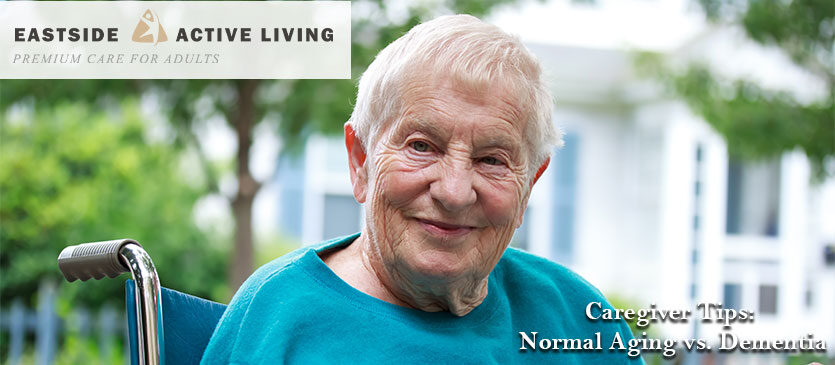
As you get older, some gradual and natural changes occur in the body and brain. Studies have shown that about 40% of people over the age of 65 will experience various degrees of memory loss, but not all memory loss is classified as dementia.
To provide adequate care to people with memory loss, caregivers need to know the difference between dementia and memory loss due to normal aging.
Normal Aging Vs Dementia
There are a few key differences between gradual memory loss and dementia. While people with age-associated memory loss may be able to take care of themselves, those suffering from dementia will require assistance.
Normal Aging
Most seniors who have age-associated memory loss lead an independent life. They do not have difficulty performing daily tasks, they can learn new things, and memory impairment is minor. Some changes you may notice are:
- An inability to recall the exact details of an event that took place more than a year ago.
- Forgetting the name of casual acquaintances.
- Forgetting where they put things.
- Occasionally forgetting a word.
Dementia
Memory loss that affects quality of life and impairs a person’s ability to perform a normal daily routine is classified as dementia. Some signs that a person suffers from dementia include:
- Being unable to recall recent conversations or events.
- Not remembering family members’ names or recognizing them.
- They have a problem with language, pause in the middle of sentences, or substitute incorrect words.
- Losing the ability to recognize numbers.
- Putting things in inappropriate places, e.g. store keys in the fridge.
- Having severe mood changes, going from being calm to enraged for no apparent reason.
- Personality changes; becoming aggressive, confrontational, suspicious, or withdrawn.
- Impaired judgment, dressing inappropriately, refusing to take medication they have been taking for years.
- Disorientation to time and/or space.
- Loved ones and family members are worried, but the person doesn’t think anything is wrong.
Tips For Caregivers Caring For People With Normal Aging And Dementia
Caring for people with normal memory loss and dementia is not easy, but it can be a very rewarding experience. Here are some tips to assist you with the process:
Have The Right Attitude
The right attitude is essential when caring for people with memory loss or dementia. You need to have compassion and empathy, coupled with a lot of patience and a sense of humor. Remember that no matter how advanced their memory loss is, the people you are caring for have feelings and need to be treated with respect and dignity.
Do Research And Gain Knowledge
There is a lot of information available about the aging process and dementia, so make a point to educate yourself. The more you know about the topic, the more confident and equipped you will be to care for people with these conditions.
Ask For And Accept Support
Caring for people with memory loss and dementia can at times be demoralizing and exhausting. Make sure that you ask for help when you need it. Joining a caregiver’s support group where you can talk about your experiences and compare notes is often very helpful. Not only does it allow you to share helpful tips, but it is also a reminder that you are never isolated or alone.
Be Realistic About The Course Of The Disease
Dementia is more than just memory loss. Depending on the area of the brain that is affected, the person may:
- Have various mood swings or complete personality changes.
- They may suffer from delusions or hallucinations.
- They may be unable to attend to even the most routine daily tasks.
- They may deteriorate and become non-responsive, unable to communicate, or even move.
It is important to remember that the patient will have good days and bad days. Your aim must be to ensure that they are comfortable and feel safe on both the good and bad days.
Speak Clearly And Give Simple Instructions
Depending on the stage of the disease, people with dementia may struggle to apply logical judgment or perform even simple tasks on their own. Your role as a caregiver is to:
- Speak clearly, using simple words. Try to avoid long, complicated sentences.
- If a task needs to be carried out, give step-by-step instructions. Allow them to complete each step before starting on the next.
- Reassure and encourage them throughout the day. People suffering from memory loss and dementia often become anxious and lose their confidence and self-esteem.
Listen To Their Stories
Take the time to patiently listen to stories of the past. Often, patients with dementia cannot remember recent events, but have a clear recollection of things that happened many years ago. Allowing them to talk about the past often makes them feel happy and relaxed.
Plan For The Future
Dementia is a progressive disease, and the patient may ultimately require professional medical care. The caregiver needs to continuously assess the patient’s health and care status and have a plan in place for when the patient will need advanced care.
Eastside Active Living For Senior Assisted And Independent Living Care
If you are looking for a facility with personalized senior assisted and independent living care options, contact Eastside Active living at 954-923-5057 today.

